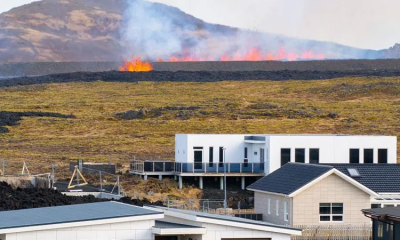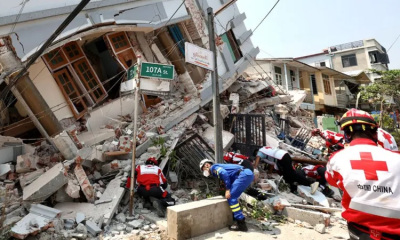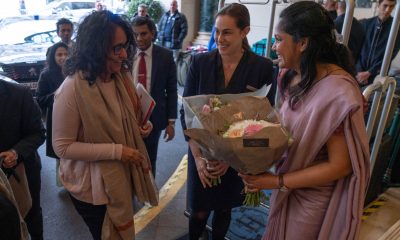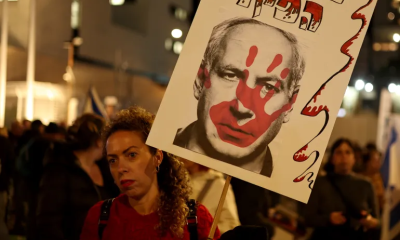Features
From Saigon to Kabul: Questionable approaches of the West, and future of Afghanistan
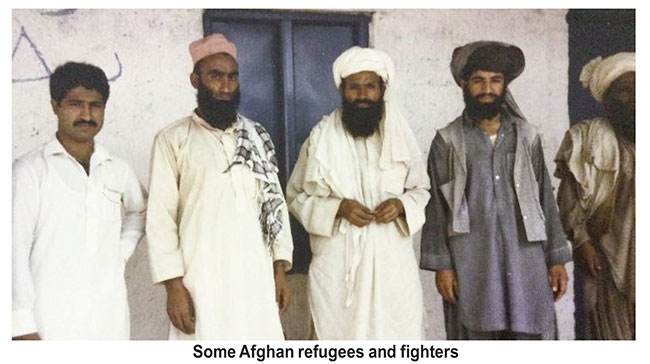
By Dr. Laksiri Fernando
US decision or Joe Biden’s decision to leave Afghanistan was correct in terms of ‘original sin’ and the socio-political, and cultural contradictions, created during the ‘colonial occupation’ since 2001. However the way they are withdrawing creates the impression that the US and other Western allies are in a terrible mess.
Without much common sense, the American and allied troops were withdrawn before their civilian supporters or citizens were evacuated. Academics and students were among them. That is why we still have a chaotic situation at the Kabul airport. Twenty odd people have already been killed. At least some of them fell from the first aircraft leaving. The scene was very much similar to Saigon, 46 years ago.
Joe Biden blamed the Afghan forces that they recruited, trained and armed during the last 20 years. ‘What can we do if they cannot fight the Taliban?’ was his explanation for the apparent betrayal. In that case why the hell did the US go to Afghanistan and virtually occupy this other people’s country? Biden did not blame President Ashraf Ghani who fled the country before anyone else.
Hypocrisy of US policies
 So many ambiguities and contradictions are exposed in respect of US foreign policies, as a result of the present crisis. Biden claimed, like other previous presidents, that US foreign policies are guided by international human rights. In the same speech he said that there is nothing more to gain by the US being in Afghanistan. His reasoning was that the US invaded Afghanistan because of the 9/11 terrorist attacks and to punish Osama bin Laden as a way of meting out justice that the American victims and people deserved.
So many ambiguities and contradictions are exposed in respect of US foreign policies, as a result of the present crisis. Biden claimed, like other previous presidents, that US foreign policies are guided by international human rights. In the same speech he said that there is nothing more to gain by the US being in Afghanistan. His reasoning was that the US invaded Afghanistan because of the 9/11 terrorist attacks and to punish Osama bin Laden as a way of meting out justice that the American victims and people deserved.
Osama bin Laden was caught and killed in 2011. Then why didn’t the Americans leave Afghanistan immediately after that? Ten more years have gone by since then. Bin Laden was not killed in Afghanistan, but in Pakistan. Even if the US wanted to eliminate not only Bin Laden but also al-Qaeda, which might make sense, why did they want to occupy the whole of Afghanistan?
There is no question that not only the US, but Western countries in general, are interested in promoting human rights and democracy in their foreign policies. But their self-interests are the cornerstone, and these interests as well as their human rights policies are overwhelmingly still marked by a form of colonial mentality. This has been the crisis from Saigon to Kabul.
History
Some people believe that the US intervention in Afghanistan started in 2001. That is not the case. It goes back to the beginning of the Cold War. Both the Soviet Union and the US wanted to keep Afghanistan as a client state. During the period of Daoud Khan (1953-1978), Afghanistan zig zagged between the two superpowers. The opportunity was taken up by the Communists and created a revolution in 1978. Afghanistan was named a People’s Democratic Republic. That was when the US started directly funding and arming Mujahideen movements of various types through Pakistan. Then the Soviet Union intervened and first invaded the country.
Understandably, any type of socialism was anathema to the US. It was not on the basis of human rights but for economic or profit reasons. It is not true that only the US backed regime after 2001 created circumstances that ensured women’s right to education and work. Those were introduced between 1978 and 1990. The communist regime also was repressive and the ordinary or rural people disliked some of the policies on religious grounds. That was the basis for the people-based Mujahedeen movements. There is evidence that the US, perhaps unintentionally, prompted some Arab Mujahideen groups to get involved in the Afghan civil war. Certain origins of Al Qaeda goes back to these efforts, if not Taliban.
Personal experience
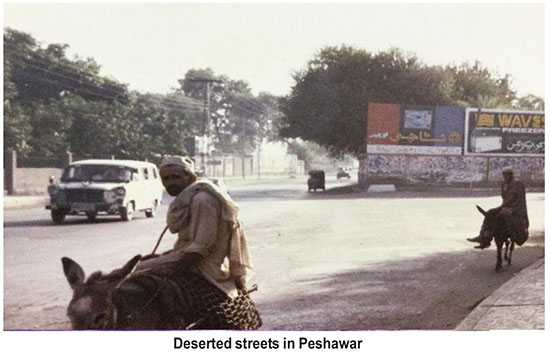 I had to visit the UNHCR office in Peshawar in 1989 as a World University Service (WUS) representative. WUS Pakistan was assisting refugees independently and apolitically. The visit involved visiting refugee camps in Azakhel and further towards the Pakistan-Afghan border. There was no possibility of crossing the border or visiting Jalalabad in Afghanistan given the heavy fighting.
I had to visit the UNHCR office in Peshawar in 1989 as a World University Service (WUS) representative. WUS Pakistan was assisting refugees independently and apolitically. The visit involved visiting refugee camps in Azakhel and further towards the Pakistan-Afghan border. There was no possibility of crossing the border or visiting Jalalabad in Afghanistan given the heavy fighting.
The wounded who were treated at Medicine San Frontier makeshift hospitals were disheartening to look at. In many makeshift camps, young boys carried heavy arms, perhaps guarding their mothers and sisters. These were supposed to be the future Taliban. I was not allowed to take many pictures except of some male refugees/activists (picture 1) and a side view of the Basic Health Unit at Azakhel Camp (picture 2). The streets in Peshawar at that time were largely deserted due to the war (picture 3).
My visit from Geneva was after the Geneva Accords in 1988 between Afghanistan and Pakistan, guaranteed by the US and the Soviet Union. The Soviet Union withdrew and the US promised not to support any faction, true or not. The civil war continued and resulted in a Taliban governed Islamic Emirate in 1997 with many other insurgency (terrorist) groups still operating in the country. The new Emirate was recognised only by a few countries, mainly Saudi Arabia, Pakistan and the UAE. And it fell quite quickly in 2001 when the US invaded.
This bit of history shows how the US, Soviet Union now gone, was involved in the Afghan debacle from the beginning, and the consequences would be extremely difficult to eliminate in the foreseeable future.
What is created?
The speed of the collapse of the US backed Afghan government of Ashraf Ghani shows the futility of what the US and some other Western governments were doing in Afghanistan during the last twenty years in the name of ‘democratic nation building.’
Democracy or human rights could be ensured primarily through internal forces and changes. These cannot be achieved through occupation or colonialism. External examples or diplomatic influence can be useful, if implemented in a friendly manner and not in an arrogant way. Even at present, the way many Western countries reacted to the first press conference of the Taliban was dismissive and arrogant.
It may be true that what they said about the rights of women, female children, the press, and amnesty to those who supported the last government cannot be fully trusted. All might depend on the circumstances. However, those should be welcomed instead of condemned outright for the sake of promoting them in a positive direction. Qualifications must be warranted, instead of sarcasm or condemnation.
What was created by the Western occupiers in Afghanistan appears to be shallow. It is true that some of the middle class sections in urban Kabul and the suburbs embraced Western values, democracy and human rights. That is good. But the great majority of the rural and remote communities were left out. They may have different values or be oblivious of democracy or human rights. Education ought to take precedence over propaganda.
What the occupation largely created were refugees. At present the population in Afghanistan is estimated to be around 40 million. According to the UNHRC, around six million Afghans are living in Iran and Pakistan as refugees. Some of them are reported to be coming back now with some national hope. The UNHCR estimated that Afghan refugees in other, mainly Western, countries amount to nearly three million. They would not come back. Who is unwilling to live in a developed country instead of a poor and a conflict ridden country? The present exodus at the Kabul airport might include not only those who worked for the occupied government but also those who aspire to live in a Western country. Large disparities in living conditions between rich and poor countries is the main reason for such an exodus.
Future challenges
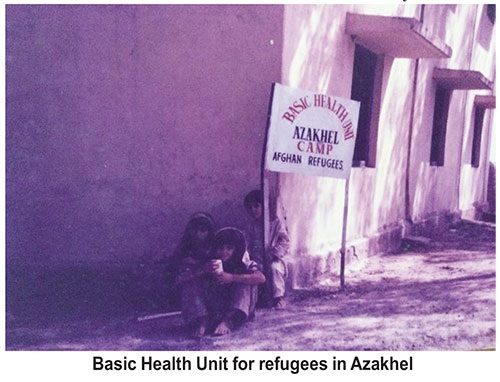 It would be an extremely difficult task for any future government in Afghanistan to run the economy, day to day administration, while rectifying confusions and conflicts created by the occupiers as well as the Afghans themselves over the past 50 years. Infrastructure development might be a top priority. One hope might be China who would offer to build destroyed or absent infrastructure in the country. There are of course skyscrapers and KFCs built in Kabul. But those are not for the poor or the ordinary.
It would be an extremely difficult task for any future government in Afghanistan to run the economy, day to day administration, while rectifying confusions and conflicts created by the occupiers as well as the Afghans themselves over the past 50 years. Infrastructure development might be a top priority. One hope might be China who would offer to build destroyed or absent infrastructure in the country. There are of course skyscrapers and KFCs built in Kabul. But those are not for the poor or the ordinary.
However, international forces may intervene. China might not be in a position to sort them out at all. China anyway cannot be a panacea. It still does not have much leverage in the UN system or the international community. Therefore, going by the colonial mentality of most of the Western countries, not to speak of the US, there can be future challenges including certain invasions and external influences. There may be a need to look for friends in the West as well. This is what Vietnam did after Saigon.
Of course, there would be major internal challenges as well. Apart from the Taliban, there have been half a dozen other armed groups in Afghanistan. Many have now been integrated into the Taliban, but not all. There can be challenges from ISIS or the remaining Al Qaeda. Whether Afghanistan would again become a haven for international terrorism is also a question. Even about the Taliban itself, we really don’t know much. Therefore, we really have to keep our fingers crossed but not be completely pessimistic, negative or arrogant like the Western pundits.
There is an apparent difference in the Taliban between, for example, 2001 and 2021, that may bring hope for a progressive world. The lessons from Saigon to Kabul are very clear. Diplomacy without interference might be the best for the world in promoting democracy and human rights.
Pics by Laksiri Fernando
Features
Inescapable need to deal with the past
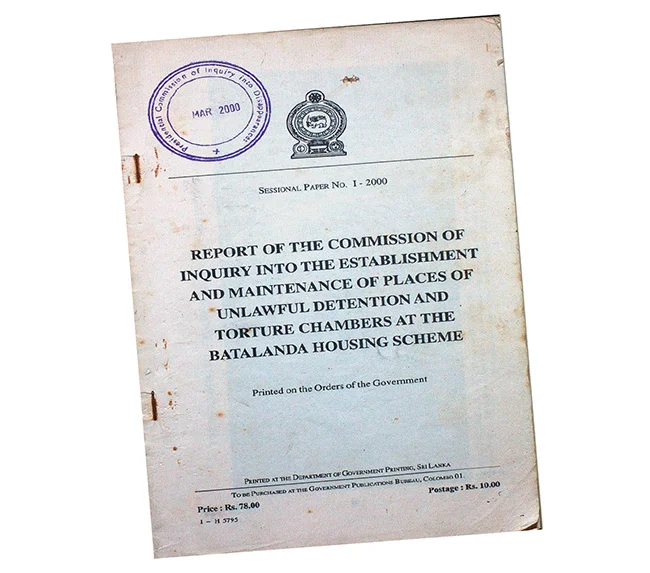
The sudden reemergence of two major incidents from the past, that had become peripheral to the concerns of people today, has jolted the national polity and come to its centre stage. These are the interview by former president Ranil Wickremesinghe with the Al Jazeera television station that elicited the Batalanda issue and now the sanctioning of three former military commanders of the Sri Lankan armed forces and an LTTE commander, who switched sides and joined the government. The key lesson that these two incidents give is that allegations of mass crimes, whether they arise nationally or internationally, have to be dealt with at some time or the other. If they are not, they continue to fester beneath the surface until they rise again in a most unexpected way and when they may be more difficult to deal with.
In the case of the Batalanda interrogation site, the sudden reemergence of issues that seemed buried in the past has given rise to conjecture. The Batalanda issue, which goes back 37 years, was never totally off the radar. But after the last of the commission reports of the JVP period had been published over two decades ago, this matter was no longer at the forefront of public consciousness. Most of those in the younger generations who were too young to know what happened at that time, or born afterwards, would scarcely have any idea of what happened at Batalanda. But once the issue of human rights violations surfaced on Al Jazeera television they have come to occupy centre stage. From the day the former president gave his fateful interview there are commentaries on it both in the mainstream media and on social media.
There seems to be a sustained effort to keep the issue alive. The issues of Batalanda provide good fodder to politicians who are campaigning for election at the forthcoming Local Government elections on May 6. It is notable that the publicity on what transpired at Batalanda provides a way in which the outcome of the forthcoming local government elections in the worst affected parts of the country may be swayed. The problem is that the main contesting political parties are liable to be accused of participation in the JVP insurrection or its suppression or both. This may account for the widening of the scope of the allegations to include other sites such as Matale.
POLITICAL IMPERATIVES
The emergence at this time of the human rights violations and war crimes that took place during the LTTE war have their own political reasons, though these are external. The pursuit of truth and accountability must be universal and free from political motivations. Justice cannot be applied selectively. While human rights violations and war crimes call for universal standards that are applicable to all including those being committed at this time in Gaza and Ukraine, political imperatives influence what is surfaced. The sanctioning of the four military commanders by the UK government has been justified by the UK government minister concerned as being the fulfilment of an election pledge that he had made to his constituents. It is notable that the countries at the forefront of justice for Sri Lanka have large Tamil Diasporas that act as vote banks. It usually takes long time to prosecute human rights violations internationally whether it be in South America or East Timor and diasporas have the staying power and resources to keep going on.
In its response to the sanctions placed on the military commanders, the government’s position is that such unilateral decisions by foreign government are not helpful and complicate the task of national reconciliation. It has faced criticism for its restrained response, with some expecting a more forceful rebuttal against the international community. However, the NPP government is not the first to have had to face such problems. The sanctioning of military commanders and even of former presidents has taken place during the periods of previous governments. One of the former commanders who has been sanctioned by the UK government at this time was also sanctioned by the US government in 2020. This was followed by the Canadian government which sanctioned two former presidents in 2023. Neither of the two governments in power at that time took visibly stronger stands.
In addition, resolutions on Sri Lanka have been a regular occurrence and have been passed over the Sri Lankan government’s opposition since 2012. Apart from the very first vote that took place in 2009 when the government promised to take necessary action to deal with the human rights violations of the past, and won that vote, the government has lost every succeeding vote with the margins of defeat becoming bigger and bigger. This process has now culminated in an evidence gathering unit being set up in Geneva to collect evidence of human rights violations in Sri Lanka that is on offer to international governments to use. This is not a safe situation for Sri Lankan leaders to be in as they can be taken before international courts in foreign countries. It is important for Sri Lanka’s sovereignty and dignity as a country that this trend comes to an end.
COMPREHENSIVE SOLUTION
A peaceful future for Sri Lanka requires a multi-dimensional approach that addresses the root causes of conflict while fostering reconciliation, justice, and inclusive development. So far the government’s response to the international pressures is to indicate that it will strengthen the internal mechanisms already in place like the Office on Missing Persons and in addition to set up a truth and reconciliation commission. The difficulty that the government will face is to obtain a national consensus behind this truth and reconciliation commission. Tamil parties and victims’ groups in particular have voiced scepticism about the value of this mechanism. They have seen commissions come and commissions go. Sinhalese nationalist parties are also highly critical of the need for such commissions. As the Nawaz Commission appointed to identify the recommendations of previous commissions observed, “Our island nation has had a surfeit of commissions. Many witnesses who testified before this commission narrated their disappointment of going before previous commissions and achieving nothing in return.”
Former minister Prof G L Peiris has written a detailed critique of the proposed truth and reconciliation law that the previous government prepared but did not present to parliament.
In his critique, Prof Peiris had drawn from the South African truth and reconciliation commission which is the best known and most thoroughly implemented one in the world. He points out that the South African commission had a mandate to cover the entire country and not only some parts of it like the Sri Lankan law proposes. The need for a Sri Lankan truth and reconciliation commission to cover the entire country and not only the north and east is clear in the reemergence of the Batalanda issue. Serious human rights violations have occurred in all parts of the country, and to those from all ethnic and religious communities, and not only in the north and east.
Dealing with the past can only be successful in the context of a “system change” in which there is mutual agreement about the future. The longer this is delayed, the more scepticism will grow among victims and the broader public about the government’s commitment to a solution. The important feature of the South African commission was that it was part of a larger political process aimed to build national consensus through a long and strenuous process of consultations. The ultimate goal of the South African reconciliation process was a comprehensive political settlement that included power-sharing between racial groups and accountability measures that facilitated healing for all sides. If Sri Lanka is to achieve genuine reconciliation, it is necessary to learn from these experiences and take decisive steps to address past injustices in a manner that fosters lasting national unity. A peaceful Sri Lanka is possible if the government, opposition and people commit to truth, justice and inclusivity.
by Jehan Perera
Features
Unleashing Minds: From oppression to liberation
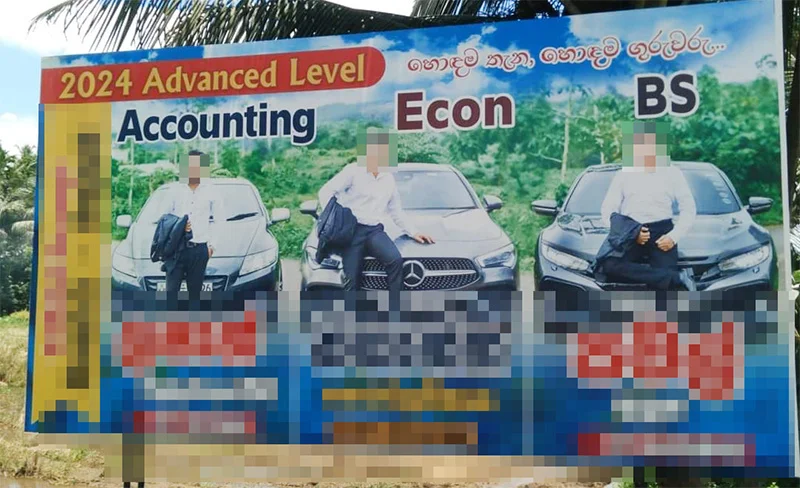
 Education should be genuinely ‘free’—not just in the sense of being free from privatisation, but also in a way that empowers students by freeing them from oppressive structures. It should provide them with the knowledge and tools necessary to think critically, question the status quo, and ultimately liberate themselves from oppressive systems.
Education should be genuinely ‘free’—not just in the sense of being free from privatisation, but also in a way that empowers students by freeing them from oppressive structures. It should provide them with the knowledge and tools necessary to think critically, question the status quo, and ultimately liberate themselves from oppressive systems.
Education as an oppressive structure
Education should empower students to think critically, challenge oppression, and envision a more just and equal world. However, in its current state, education often operates as a mechanism of oppression rather than liberation. Instead of fostering independent thinking and change, the education system tends to reinforce the existing power dynamics and social hierarchies. It often upholds the status quo by teaching conformity and compliance rather than critical inquiry and transformation. This results in the reproduction of various inequalities, including economic, racial, and social disparities, further entrenching divisions within society. As a result, instead of being a force for personal and societal empowerment, education inadvertently perpetuates the very systems that contribute to injustice and inequality.
Education sustaining the class structure
Due to the widespread privatisation of education, the system continues to reinforce and sustain existing class structures. Private tuition centres, private schools, and institutions offering degree programmes for a fee all play a significant role in deepening the disparities between different social classes. These private entities often cater to the more affluent segments of society, granting them access to superior education and resources. In contrast, students from less privileged backgrounds are left with fewer opportunities and limited access to quality education, exacerbating the divide between the wealthy and the underprivileged. This growing gap in educational access not only limits social mobility but also perpetuates a cycle where the privileged continue to secure better opportunities while the less fortunate struggle to break free from the constraints of their socio-economic status.
Gender Oppression
Education subtly perpetuates gender oppression in society by reinforcing stereotypes, promoting gender insensitivity, and failing to create a gender-sensitive education system. And some of the policymakers do perpetuate this gender insensitive education by misinforming people. In a recent press conference, one of the former members of Parliament, Wimal Weerawansa, accused gender studies of spreading a ‘disease’ among students. In the year 2025, we are still hearing such absurdities discouraging gender studies. It is troubling and perplexing to hear such outdated and regressive views being voiced by public figures, particularly at a time when societies, worldwide, are increasingly embracing diversity and inclusion. These comments not only undermine the importance of gender studies as an academic field but also reinforce harmful stereotypes that marginalise individuals who do not fit into traditional gender roles. As we move forward in an era of greater social progress, such antiquated views only serve to hinder the ongoing work of fostering equality and understanding for all people, regardless of gender identity.
Students, whether in schools or universities, are often immersed in an educational discourse where gender is treated as something external, rather than an essential aspect of their everyday lives. In this framework, gender is framed as a concern primarily for “non-males,” which marginalises the broader societal impact of gender issues. This perspective fails to recognise that gender dynamics affect everyone, regardless of their gender identity, and that understanding and addressing gender inequality is crucial for all individuals in society.
A poignant example of this issue can be seen in the recent troubling case of sexual abuse involving a medical doctor. The public discussion surrounding the incident, particularly the media’s decision to disclose the victim’s confidential statement, is deeply concerning. This lack of respect for privacy and sensitivity highlights the pervasive disregard for gender issues in society.
What makes this situation even more alarming is that such media behaviour is not an isolated incident, but rather reflects a broader pattern in a society where gender sensitivity is often dismissed or ignored. In many circles, advocating for gender equality and sensitivity is stigmatised, and is even seen as a ‘disease’ or a disruptive force to the status quo. This attitude contributes to a culture where harmful gender stereotypes persist, and where important conversations about gender equity are sidelined or distorted. Ultimately, this reflects the deeper societal need for an education system that is more attuned to gender sensitivity, recognising its critical role in shaping the world students will inherit and navigate.
To break free from these gender hierarchies there should be, among other things, a gender sensitive education system, which does not limit gender studies to a semester or a mere subject.
Ragging
The inequality that persists in class and regional power structures (Colombo and non-Colombo division) creeps into universities. While ragging is popularly seen as an act of integrating freshers into the system, its roots lie in the deeply divided class and ethno-religious divisions within society.
In certain faculties, senior students may ask junior female students to wear certain fabrics typically worn at home (cheetta dresses) and braid their hair into two plaits, while male students are required to wear white, long-sleeved shirts without belts. Both men and women must wear bathroom slippers. These actions are framed as efforts to make everyone equal, free from class divisions. However, these gendered and ethicised practices stem from unequal and oppressive class structures in society and are gradually infiltrating university culture as mechanisms of oppression.The inequality that persists in gradually makes its way into academic institutions, particularly universities.
These practices are ostensibly intended to create a sense of uniformity and equality among students, removing visible markers of class distinction. However, what is overlooked is that these actions stem from deeply ingrained and unequal social structures that are inherently oppressive. Instead of fostering equality, they reinforce a system where hierarchical power dynamics in the society—rooted in class, gender, and region—are confronted with oppression and violence which is embedded in ragging, creating another system of oppression.
Uncritical Students
In Sri Lanka, and in many other countries across the region, it is common for university students to address their lecturers as ‘Sir’ and ‘Madam.’ This practice is not just a matter of politeness, but rather a reflection of deeply ingrained societal norms that date back to the feudal and colonial eras. The use of these titles reinforces a hierarchical structure within the educational system, where authority is unquestioned, and students are expected to show deference to their professors.
Historically, during colonial rule, the education system was structured around European models, which often emphasised rigid social distinctions and the authority of those in power. The titles ‘Sir’ and ‘Madam’ served to uphold this structure, positioning lecturers as figures of authority who were to be respected and rarely challenged. Even after the end of colonial rule, these practices continued to permeate the education system, becoming normalised as part of the culture.
This practice perpetuates a culture of obedience and respect for authority that discourages critical thinking and active questioning. In this context, students are conditioned to see their lecturers as figures of unquestionable authority, discouraging dialogue, dissent, or challenging the status quo. This hierarchical dynamic can limit intellectual growth and discourage students from engaging in open, critical discussions that could lead to progressive change within both academia and society at large.
Unleashing minds
The transformation of these structures lies in the hands of multiple parties, including academics, students, society, and policymakers. Policymakers must create and enforce policies that discourage the privatisation of education, ensure equal access for all students, regardless of class dynamics, gender, etc. Education should be regarded as a fundamental right, not a privilege available only to a select few. Such policies should also actively promote gender equality and inclusivity, addressing the barriers that prevent women, LGBTQ+ individuals, and other marginalised genders from accessing and succeeding in education. Practices that perpetuate gender inequality, such as sexism, discrimination, or gender-based violence, need to be addressed head-on. Institutions must prioritise gender studies and sensitivity training to cultivate an environment of respect and understanding, where all students, regardless of gender, feel safe and valued.
At the same time, the micro-ecosystems of hierarchy within institutions—such as maintaining outdated power structures and social divisions—must be thoroughly examined and challenged. Universities must foster environments where critical thinking, mutual respect, and inclusivity—across both class and gender—are prioritised. By creating spaces where all minds can flourish, free from the constraints of entrenched hierarchies, we can build a more equitable and intellectually vibrant educational system—one that truly unleashes the potential of all students, regardless of their social background.
(Anushka Kahandagamage is the General Secretary of the Colombo Institute for Human Sciences)
Kuppi is a politics and pedagogy happening on the margins of the lecture hall that parodies, subverts, and simultaneously reaffirms social hierarchies.
By Anushka Kahandagamage
Features
New vision for bassist Benjy
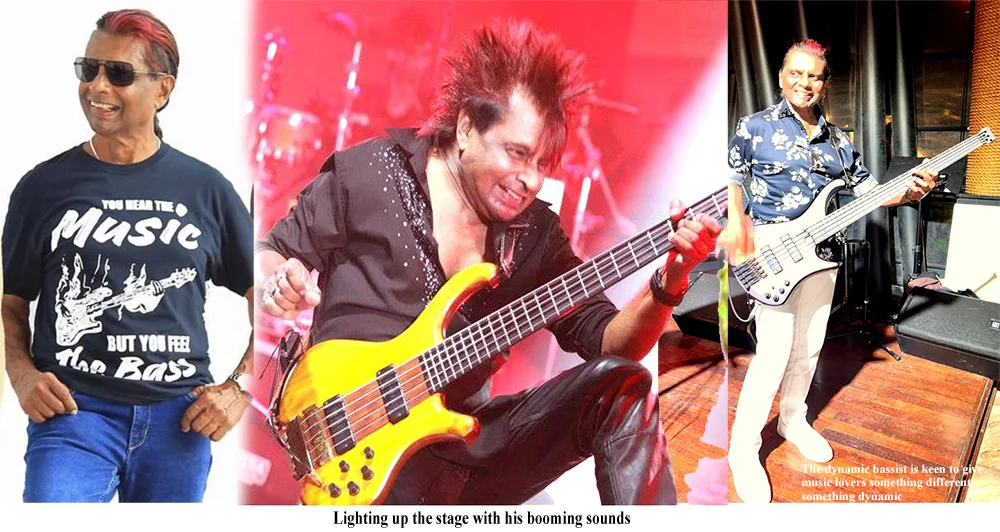
It’s a known fact that whenever bassist Benjy Ranabahu booms into action he literally lights up the stage, and the exciting news I have for music lovers, this week, is that Benjy is coming up with a new vision.
One thought that this exciting bassist may give the music scene a layoff, after his return from the Seychelles early this year.
At that point in time, he indicated to us that he hasn’t quit the music scene, but that he would like to take a break from the showbiz setup.
“I’m taking things easy at the moment…just need to relax and then decide what my future plans would be,” he said.
However, the good news is that Benjy’s future plans would materialise sooner than one thought.
Yes, Benjy is putting together his own band, with a vision to give music lovers something different, something dynamic.
He has already got the lineup to do the needful, he says, and the guys are now working on their repertoire.
The five-piece lineup will include lead, rhythm, bass, keyboards and drums and the plus factor, said Benjy, is that they all sing.
A female vocalist has also been added to this setup, said Benjy.
“She is relatively new to the scene, but with a trained voice, and that means we have something new to offer music lovers.”
The setup met last week and had a frank discussion on how they intend taking on the music scene and everyone seems excited to get on stage and do the needful, Benjy added.
Benjy went on to say that they are now spending their time rehearsing as they are very keen to gel as a team, because their skills and personalities fit together well.
“The guys I’ve got are all extremely talented and skillful in their profession and they have been around for quite a while, performing as professionals, both here and abroad.”
Benjy himself has performed with several top bands in the past and also had his own band – Aquarius.
Aquarius had quite a few foreign contracts, as well, performing in Europe and in the Middle East, and Benjy is now ready to do it again!
-

 Sports3 days ago
Sports3 days agoSri Lanka’s eternal search for the elusive all-rounder
-

 Features7 days ago
Features7 days agoCelebrating 25 Years of Excellence: The Silver Jubilee of SLIIT – PART I
-

 News4 days ago
News4 days agoGnanasara Thera urged to reveal masterminds behind Easter Sunday terror attacks
-

 Business7 days ago
Business7 days agoCEB calls for proposals to develop two 50MW wind farm facilities in Mullikulam
-

 Business5 days ago
Business5 days agoAIA Higher Education Scholarships Programme celebrating 30-year journey
-

 Features7 days ago
Features7 days agoNotes from AKD’s Textbook
-

 News2 days ago
News2 days agoBid to include genocide allegation against Sri Lanka in Canada’s school curriculum thwarted
-

 News3 days ago
News3 days agoComBank crowned Global Finance Best SME Bank in Sri Lanka for 3rd successive year


